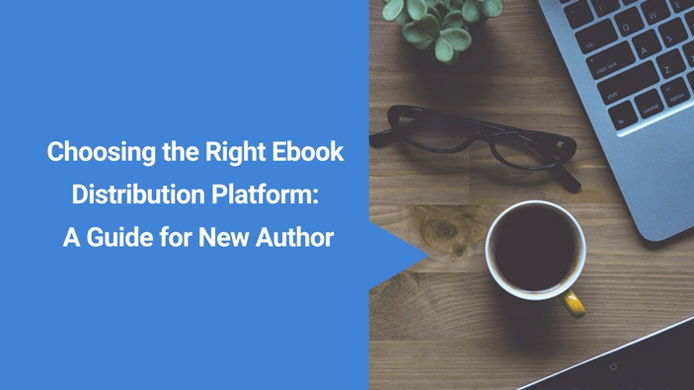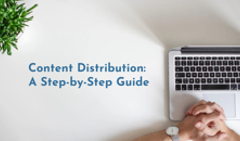There has been an 18.2% jump in ebook revenues this year over last year.
What does this mean?
If you are an author or content producer contemplating venturing into the eBook market, now is the best time to enter the market as the global audience is going after digitized books. But as you may have noticed, getting huge revenues from an ebook lies not only in creating engaging content that hooks your readers but also on your ebook distribution platform.
What is an Ebook Distribution Platform?
An eBook distribution platform helps you as an author to get your digitized books or other digital publications in the eyes of many book lovers, and monetize them.
Besides, these platforms have robust tools that organize and manage your content as well as provide you powerful reports you can use for both competitor analysis and marketing purposes. But why use an ebook distribution platform?
- Increase sales as your ebook becomes more accessible to a wider readership
- Save time, effort, and capital of creating your own distribution platform
- Enjoy invaluable benefits like testing content to ensure it is acceptable by the audience and get analytics on user behavior
- Publish content in various languages
- Simplify the ebook creation process
- Easily integrate with other platforms for more reach
5 factors to Consider When Choosing an Ebook Distribution Platform
Understanding the benefits of ebook distribution platforms is the first step to choosing the right platform. After all, it is not just your money that is at stake here, but also your effort and hard work.
Here are the factors to consider when choosing an ebook distribution platform.
#1 Revenue split
For you as an author, how you split revenue from ebook sales is the number one factor to consider when outsourcing a distribution platform. You do not want to pick a platform that will eat into your profits. Compare how different vendors calculate royalties or split revenue on each sale of an ebook. Do they use flat fee pay-per-month models or a percentage cut of the net or list price? Comparing and analyzing how revenue is divided will help you decide whether to settle on a platform for the long-run or short-run and switch platforms if things don’t work.
Another important factor to take into account here is the matching competitor price. It allows the distributor to sell your ebook at a lower price to match the distributor’s price or a third-party price for the physical or digital version of the same book. Learn how that could affect your revenue.
Study the subscription options or membership options the distributor offers readers. Do they offer monthly subscriptions or lifetime value? These have the potential to affect your total revenue if readers are given huge discounts for choosing lifetime membership.
#2 Audience size or reach
When choosing an ebook distribution platform, pick one with a greater reach or wider network, so you focus less on other ways to find new markets. Factors to consider here may include:
- The languages your ebook can be translated into
- Countries served
- Device compatibility
- The operating system, web browsers, and software applications that promote sharing and consumption of your ebook
The ebook distributor should at least meet most of these requirements as each reader has different demands.
#3 Ebook format
In what formats do you want your ebook to be published? The most popular formats include EPUB, MOBI, TXT, PDF, and AZW. Note that different ebook distributors use different formats or a combination of several formats depending on their platform’s interface or structure.
For heavy text-based content choose TXT or PDF. And EPUB works well for interactive and graphical content.
Understand that format also affects device type. For example, AZW, MOBI, KFX formats are more common with Kindle devices, and PDF, EPUB with iPad, Mac, Android OS, or Sony products. So be careful with the formats you choose, as different formats and device types will definitely affect your reach. To succeed, study your audience content preference and choose a format that will increase the chances of your ebook being accepted.
#4 Reporting tools
As an author, you need to look into the business aspect. It is important to analyze reader response and track how your ebook performs. That means you should look for an ebook distribution platform that offers you lots of analytical data and reporting on your readers and sales.
Having the right data will enable you to pick out what your audience is saying about your book and optimize for better results and engagements. Here are the features or data an ebook platform should provide you with:
- Real-time user engagement, behavior, impressions, and frequencies
- Traffic sources
- Reader locations
- Tracking of reader engagement with content
- Average, total, and annual sales
- Integration with other tools like Google Analytics, community platforms, and online catalogs like Goodreads.
Such online tools as FlippingBook can help you gather valuable insights on how your audience interacts with your ebook and make it even more efficient. With the lead capture form and built-in statistics, you can track the number of people and total views your ebooks drive, what pages are the most engaging, and how many time readers spend reading your content. Plus, you can gather info about your leads and contact them at the right time.
These insights or data show the influence of your ebook on your readers and set the direction for your marketing efforts, such as running email or social media marketing campaigns. It makes sense to choose an ebook platform that gives you lots of analytics and reporting data to use.
#5 The platform’s policy
This goes beyond just checking out the distributor’s guidelines and penalties for not following said guidelines or distribution laws. Look for a clear policy on financial liabilities or ebook distribution rights. If the distributor allows its audience to rent ebooks, inquire about such a policy, the rental periods, and how it will impact your revenues.
Look out for promotions, inventory, copy and paste, printing, and refund policies and what they include. When in doubt, consult the distributor or other content producers.
Wrapping Up
Completing your creative work is only half the battle. You also need a robust content distribution plan to locate new markets for your ebook. And that starts with finding the right platform for your ebook.
With the above steps, you should be able to pick a platform that makes fulfilling orders simple, checking sales a breeze, and meeting your reader’s demands less of a hassle. The right platform should, therefore, help you focus on the number-one aspect of your ebook— content creation.
Author's bio:
Adela Belin is a content marketer and blogger at Writers Per Hour. She is passionate about sharing stories with the hope to make a difference in people's lives and contribute to their personal and professional growth. Find her on Twitter and LinkedIn.





